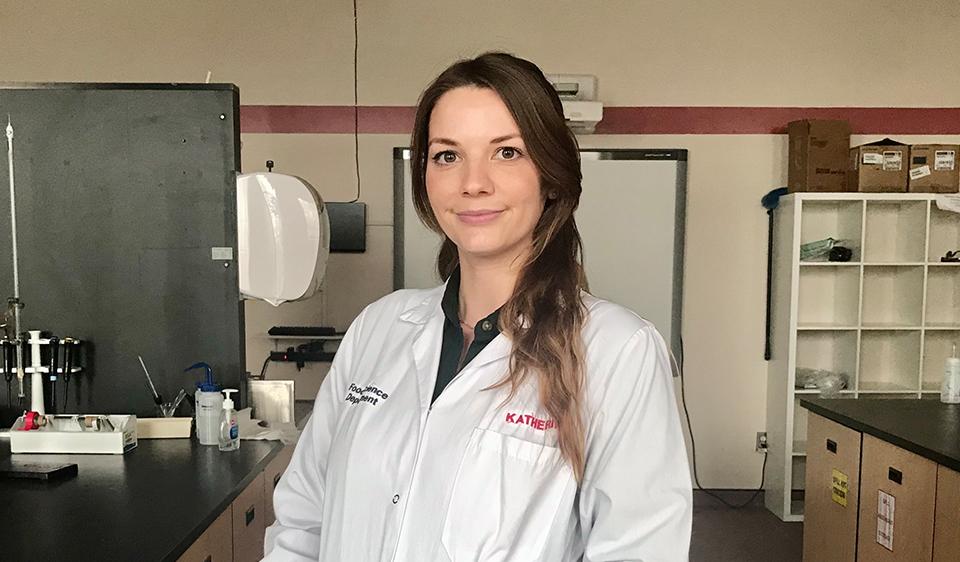Meet Katherine, PhD Food Science Student

About Katherine Petker
Katherine is pursuing a PhD in Food Science. She is part of the Food Science Graduate Club and works as a teaching assistant (TA) with the Department of Food Science. She plans to continue with research focused on plant proteins and interface science for applications in the food, pharmaceutical, or cannabis industries after graduation.
Program: PhD Food Science
Hometown: Stratford, ON
What did you study for your undergraduate degree?
My undergraduate degree was in chemical engineering at the University of Ottawa.
Why did you decide to pursue graduate studies at the University of Guelph? Did your undergrad experience shape your decision to further your studies?
I chose to pursue my graduate studies at the University of Guelph due to the great reputation of the Food Science program. During my undergrad co-op placements, I had the opportunity to work in a lab environment and learn chemical and physical analysis techniques, which I really enjoyed. I decided to pursue graduate studies and wanted to apply the skills I learned in my undergrad to study food systems, and Guelph was the best place for me to do that.
What is your research focus?
My research focuses on using nanoparticles made from the proteins in wheat and oats to stabilize interfaces in food systems. Interfaces are the boundaries between different components which do not mix (i.e. oil and water in salad dressing) and are typically highly unstable. If an interface is not populated by molecules or particles, the structure and quality of the food product is compromised. The goal of my research is to create plant-based protein nanoparticles which can provide enhanced stability to the interfaces in emulsions and foams and study their behaviour at a wide variety of processing and storage conditions.
How have you found ways to get involved as a grad student?
The Department of Food Science is a great community and I’ve found it easy to get involved and make friends. I’ve been a member of the Food Science Graduate Club for the past few years and help to plan events for faculty, staff, and graduate students. I’ve also been a Food Chemistry teaching assistant (TA) throughout my grad studies which has been a lot of fun and has given me the opportunity to get to know and learn alongside the Food Science undergrads each year.
How has your graduate program experience been different from your undergrad experience?
Graduate school has been different from my undergrad in many ways. As I’m in a thesis-based program, I spend most of my days running experiments, analyzing results, reading articles, and writing. There’s much less coursework and direction, which requires you to be more independent and disciplined with your time. I also have a much closer relationship with the other students, faculty, and staff in my department than I did in undergrad, as we work together and collaborate frequently.
Where are your favourite spots in Guelph?
I love all the green space in and around Guelph. Preservation Park and Starkey Hill are great places to spend some time outside. Some other favourites are Trivia Night at the grad lounge on campus and going to see live music or doing karaoke at Jimmy Jazz downtown.
What do you find most challenging about your program?
The most challenging thing about grad school has been balancing all the different types of work that need to be done. Lab work, writing, coursework, and TA assignments can all take up a significant amount of time and it requires effective time management to get it all done. The most rewarding thing so far was the publication of my first research article this past year after a lot of hard work and long lab days/nights.
What are some free-time activities that make you happy, or relieves stress?
In my free-time, I enjoy getting outside for some exercise — running, biking, hiking, or canoeing (my personal favourite). I also love to cook and bake. I love to try new recipes!
What are your plans or goals after graduation?
After finishing my PhD, I’m interested in continuing to do research focused on plant proteins or colloid and interface science for applications in the food, pharmaceutical, or cannabis industries.
What advice would you give to an undergrad student considering graduate school?
My advice to undergrad students is to seek out experiences in the areas that you’re interested in pursuing. If you’re considering a research-based graduate program, gaining some lab experience in your undergrad is important to make sure it’s something you want to do full-time in grad school.
What or who is your greatest inspiration? Why?
I’m most inspired and motivated by the colleagues and mentors I work with in the Department of Food Science. They have inspired me to approach problems from different perspectives and have been incredibly generous in sharing their time, knowledge, and expertise with me.
What's one fun fact about yourself?
I love to plan theme parties and events. I’m always seeking out a reason to celebrate with my family, friends, or colleagues so I have an excuse to plan a party.